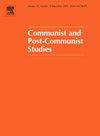"我们将作为自由人而死"
IF 1.3
4区 社会学
Q3 INTERNATIONAL RELATIONS
引用次数: 1
摘要
关于COVID-19对动员的影响的研究广泛侧重于社交媒体、阴谋论和分裂叙事的作用。然而,个人的看法仍然没有得到充分的研究。本文认为,幻想叙事是动员的核心,旨在分析大流行期间话语的变化是幻想逻辑转变的结果。它将逻辑方法应用于立陶宛的案例,以确定在回应政府行为时变得明显的话语的幻想逻辑的主要变化。这篇文章分析了在宣布“隔离未接种者”的两个月期间(2021年6月至8月)收集的社交媒体帖子数据。分析揭示了话语的幻想逻辑的重大变化——他者不再被抗议者视为为了自己的利益而腐败,而是纯粹的邪恶,这反过来又导致了各种阴谋论的开放。本文章由计算机程序翻译,如有差异,请以英文原文为准。
“We Will Die as Free People”
Research on the impact of COVID-19 on mobilization focuses extensively on the role of social media, conspiracy theories, and divisive narratives. However, individual perceptions remain insufficiently researched. This article argues that fantasmatic narratives are central to mobilization and aims to analyze changes in discourse during the pandemic as outcomes of shifts in fantasmatic logics. It applies the logics approach to the Lithuanian case to identify the main changes in fantasmatic logics of discourse that became apparent in response to government action. The article analyzes data from social media posts, gathered over a period of two months (June–August 2021), the period centered around the announcement of the “quarantine of the unvaccinated.” The analysis revealed significant changes in fantasmatic logics of discourse—the Other was no longer seen as corrupt for their own gain by the protesters, but as purely evil, which in turn led to openness to various conspiracy theories.
求助全文
通过发布文献求助,成功后即可免费获取论文全文。
去求助
来源期刊

Communist and Post-Communist Studies
Multiple-
CiteScore
1.90
自引率
0.00%
发文量
23
期刊介绍:
Communist and Post-Communist Studies is an international journal covering all communist and post-communist states and communist movements, including both their domestic policies and their international relations. It is focused on the analysis of historical as well as current developments in the communist and post-communist world, including ideology, economy and society. It also aims to provide comparative foci on a given subject by inviting comments of a comparative character from scholars specializing in the same subject matter but in different countries.
 求助内容:
求助内容: 应助结果提醒方式:
应助结果提醒方式:


